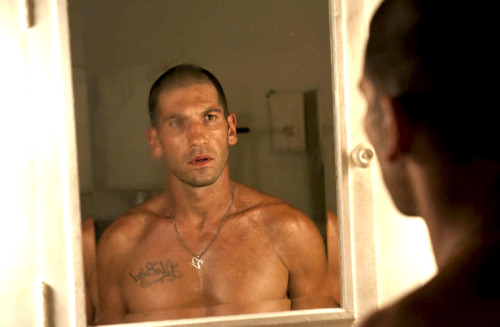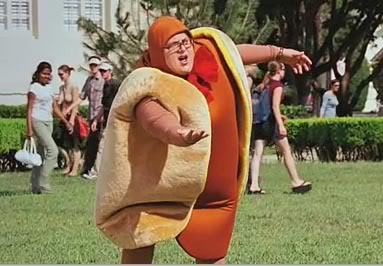I was fortunate enough to catch The Rock (1996) playing on Spike TV a few nights ago. As I watched The Cage, Sean Connery, Ed Harris, and that dude was a cop in every 90s movie ever finely chew scenery around a constant barrage of explosions and shots that look like this, an intriguing idea dawned on me. I feel like I had always known this but for whatever reason it was so clear this time around. The Rock tells the final fate of Sean Connery's 007.
The core story within Michael Bay's magnum opus, is the terrorist takeover of Alcatraz Prison, now a tourist attraction. Because Bay works in worlds of high concept premises, like teams of oil drillers becoming astronauts, the elite FBI operatives decide to take a chance on the one dude who ever escaped from Alcatraz - Sean Connery's character, Captain John Patrick Mason, who I suspect to largely be a culmination of Connery's James Bond.
Mason was a British spy who was captured by the Americans in the late 1960s, although at some point he managed to escape, bang some broad immediately (even picturing Connery as late as Never Say Never Again [1983] this is possible), only to be locked up again. Mason is a notorious escape artist and spy, whose existence has been disavowed by both the British and American governments. Within his head are decades of secrets and adventures both nations would rather forget. He's capable of kicking tremendous ass, even though he's in his mid-60s, and handles any kind of firearm or close combat weapon with ease. The choice of Connery to play the character after he was Bond in the 60s is not a coincidence. He is meant to inspire that recollection as a nod to his past role.
There are more interesting ideas at work here though. Michael Bay, jingoist American as he is, decided that Bond's final fate would be American captivity. It is as if Bond could escape anyone but the American government, which imprisoned him for half his life despite repeated break-outs. In this way the Americans have captured a rival cultural icon. Bond encapsulated so much style, wit, and class of a British action hero, along with a longevity that is unparalleled throughout any other film series, that it's natural we should have a cultural jealousy. Perhaps out of this jealousy Bay had the icon under American custody and partnered with Nic Cage, who would continue in his own right to be an awful American action film star.
It's also a look at what would happen to Bond in a true 90s action film. It's almost prophetic of Casino Royale (2005). Gone are martinis or gadgets, the only thing left is Bond at his core. He's an old man largely full of regret but unable to change what he knows or what he does - getting out of hairy situations with timing and wit while killing enemies in cold blood. It's a thorough Americanization - no more of the dignified pontifications of From Russia with Love (1963) or the cunning game of cat and mouse of Goldfinger (1964). Instead they shoot stuff. A lot.
Furthermore, it's a keen twist that our "Bond" here is using the escape tricks and deadly force he honed against the Soviets against Americans instead. This includes the complicated relationship he has with Cage and the rest of the FBI guys as well as the main antagonists. Bay actually layers and contrasts his own jingoism with these, a group of terrorists comprised of former Marines disillusioned with the abandonment of their government. This is exactly the fate of Mason, who was disavowed after he was captured. Mason, however, responds in a very English way (I'm sure I'll hear cries that Connery is Scottish here, he's still acting English), by suffering but holding true to queen and country. It's a much more American reaction to take charge for perceived slights against a loss of individual freedom or recognition.
The Rock's greatest achievement is Ed Harris' character, Francis X. Hummel, the General who leads the Marines into treason but never quite buys it himself. His late reformation dooms his own men but the reveal that the entire escapade was a big bluff is the film's most satisfying moment. That said, Hummel lost control of his men a long time before this, a demonstration that what patriotism these men really had was lost when they decided to turn. Mason doesn't have this, and as such he identifies with Hummel, even though there is nothing really analogous in any Bond film. Indeed, films like Die Another Day (2002) take as dim a view of American shoot-first policy as The Rock does implicitly.
Like I said, I think this is something we've always known. Connery's character and casting is fairly obvious. What isn't obvious though, are the cultural implications of stealing an immortal British icon and re-purposing him in one of the more obliquely jingoistic American movies ever made. It's also re-purposing him in a hard R-Rated adventure, which is cool to hear "Bond" swear.
The core story within Michael Bay's magnum opus, is the terrorist takeover of Alcatraz Prison, now a tourist attraction. Because Bay works in worlds of high concept premises, like teams of oil drillers becoming astronauts, the elite FBI operatives decide to take a chance on the one dude who ever escaped from Alcatraz - Sean Connery's character, Captain John Patrick Mason, who I suspect to largely be a culmination of Connery's James Bond.
Mason was a British spy who was captured by the Americans in the late 1960s, although at some point he managed to escape, bang some broad immediately (even picturing Connery as late as Never Say Never Again [1983] this is possible), only to be locked up again. Mason is a notorious escape artist and spy, whose existence has been disavowed by both the British and American governments. Within his head are decades of secrets and adventures both nations would rather forget. He's capable of kicking tremendous ass, even though he's in his mid-60s, and handles any kind of firearm or close combat weapon with ease. The choice of Connery to play the character after he was Bond in the 60s is not a coincidence. He is meant to inspire that recollection as a nod to his past role.
There are more interesting ideas at work here though. Michael Bay, jingoist American as he is, decided that Bond's final fate would be American captivity. It is as if Bond could escape anyone but the American government, which imprisoned him for half his life despite repeated break-outs. In this way the Americans have captured a rival cultural icon. Bond encapsulated so much style, wit, and class of a British action hero, along with a longevity that is unparalleled throughout any other film series, that it's natural we should have a cultural jealousy. Perhaps out of this jealousy Bay had the icon under American custody and partnered with Nic Cage, who would continue in his own right to be an awful American action film star.
It's also a look at what would happen to Bond in a true 90s action film. It's almost prophetic of Casino Royale (2005). Gone are martinis or gadgets, the only thing left is Bond at his core. He's an old man largely full of regret but unable to change what he knows or what he does - getting out of hairy situations with timing and wit while killing enemies in cold blood. It's a thorough Americanization - no more of the dignified pontifications of From Russia with Love (1963) or the cunning game of cat and mouse of Goldfinger (1964). Instead they shoot stuff. A lot.
Furthermore, it's a keen twist that our "Bond" here is using the escape tricks and deadly force he honed against the Soviets against Americans instead. This includes the complicated relationship he has with Cage and the rest of the FBI guys as well as the main antagonists. Bay actually layers and contrasts his own jingoism with these, a group of terrorists comprised of former Marines disillusioned with the abandonment of their government. This is exactly the fate of Mason, who was disavowed after he was captured. Mason, however, responds in a very English way (I'm sure I'll hear cries that Connery is Scottish here, he's still acting English), by suffering but holding true to queen and country. It's a much more American reaction to take charge for perceived slights against a loss of individual freedom or recognition.
The Rock's greatest achievement is Ed Harris' character, Francis X. Hummel, the General who leads the Marines into treason but never quite buys it himself. His late reformation dooms his own men but the reveal that the entire escapade was a big bluff is the film's most satisfying moment. That said, Hummel lost control of his men a long time before this, a demonstration that what patriotism these men really had was lost when they decided to turn. Mason doesn't have this, and as such he identifies with Hummel, even though there is nothing really analogous in any Bond film. Indeed, films like Die Another Day (2002) take as dim a view of American shoot-first policy as The Rock does implicitly.
Like I said, I think this is something we've always known. Connery's character and casting is fairly obvious. What isn't obvious though, are the cultural implications of stealing an immortal British icon and re-purposing him in one of the more obliquely jingoistic American movies ever made. It's also re-purposing him in a hard R-Rated adventure, which is cool to hear "Bond" swear.












